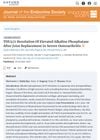 October 2023 in “Journal of the Endocrine Society”
October 2023 in “Journal of the Endocrine Society” Joint replacement surgery normalized high alkaline phosphatase levels in a patient with severe osteoarthritis.
 August 2023 in “International Journal For Multidisciplinary Research”
August 2023 in “International Journal For Multidisciplinary Research” Ayurvedic treatment, exercise, and a healthy diet can effectively manage PCOD symptoms.
 January 2023 in “Applied sciences”
January 2023 in “Applied sciences” Gefitinib and Sasam-Kyeongokgo together significantly reduce cancer growth and improve immune response in mice.
March 2021 in “World rabbit science” Adding 0.2% taurine to Angora rabbits' diet improves wool production and overall health.
 November 2020 in “Elsevier eBooks”
November 2020 in “Elsevier eBooks” Antiandrogens and androgen inhibitors like spironolactone, finasteride, and dutasteride can treat hair loss and skin conditions, but they have risks and side effects, including potential harm to pregnant women and risks of cancer and heart issues. Herbal remedies also have antiandrogenic effects but lack safety validation.
 January 2019 in “Jui rinsho hifuka”
January 2019 in “Jui rinsho hifuka” A dog's hair loss was caused by a hormone-secreting testicular tumor.
 January 2015 in “Turkiye Klinikleri Journal of Endocrinology”
January 2015 in “Turkiye Klinikleri Journal of Endocrinology” PCOS patients with autoimmune thyroid disease have lower DHEAS levels.
 January 2014 in “European Geriatric Medicine”
January 2014 in “European Geriatric Medicine” A postmenopausal woman's virilization was caused by a rare ovarian tumor that was hard to detect but was successfully treated with surgery.
 December 2011 in “The Egyptian Journal of Histology”
December 2011 in “The Egyptian Journal of Histology” High-fructose diets can cause irreversible kidney damage.
Melatonin reduced oxidative damage, inflammation, and protected hair cells in scalded rats.
 11 citations,
September 2012 in “Journal of obstetrics and gynaecology Canada”
11 citations,
September 2012 in “Journal of obstetrics and gynaecology Canada” Testosterone therapy seems safe for short-term use in postmenopausal women with low sexual desire, but more research on long-term effects is needed.
 4 citations,
March 2006 in “Journal of renal nutrition”
4 citations,
March 2006 in “Journal of renal nutrition” Dialysis patients benefit from water-soluble vitamins but need careful management to avoid risks.
 August 2018 in “Journal of The American Academy of Dermatology”
August 2018 in “Journal of The American Academy of Dermatology” Different treatments for skin conditions were found to be effective and generally safe, with biologics recommended as the first choice for generalized pustular psoriasis.
48 citations,
May 2018 in “JEADV. Journal of the European Academy of Dermatology and Venereology/Journal of the European Academy of Dermatology and Venereology” People with alopecia areata often have lower vitamin D levels and are more likely to be deficient in it.
3 citations,
January 1996 in “Journal of Dermatological Treatment” The ointment is a safe, effective, and well-tolerated treatment for certain types of psoriasis.
2 citations,
April 2023 in “PubMed” Improving maternal diets can prevent severe health issues, including death, from goiter in goat kids.
3 citations,
November 2022 in “The Egyptian Rheumatologist” Macrophage activation syndrome can be a deadly first sign of systemic lupus erythematosus.
 October 2010 in “Reproductive Biomedicine Online”
October 2010 in “Reproductive Biomedicine Online” Women with PCOS and androgenic alopecia have different triglyceride metabolism compared to those without hair loss.
 36 citations,
August 2011 in “Experimental Dermatology”
36 citations,
August 2011 in “Experimental Dermatology” Eccrine sweat gland's clear cells likely cause excessive sweating in hyperhidrosis.
 January 2010 in “Yearbook of Endocrinology”
January 2010 in “Yearbook of Endocrinology” Two new compounds can block androgen receptor activity in different ways and may lead to new treatments for androgen-related diseases.
 49 citations,
December 1997 in “Urology”
49 citations,
December 1997 in “Urology” Tamoxifen effectively treats gynecomastia without causing impotence.
 21 citations,
December 2012 in “Maturitas”
21 citations,
December 2012 in “Maturitas” Testosterone implants in women require pharmacological dosing to be effective and are generally safe and well-tolerated.
 3 citations,
May 2011 in “Journal of Obstetrics and Gynaecology”
3 citations,
May 2011 in “Journal of Obstetrics and Gynaecology” A woman's pelvic pain and bleeding led to finding and successfully treating a rare benign tumor in her reproductive system.
 April 2018 in “The journal of investigative dermatology/Journal of investigative dermatology”
April 2018 in “The journal of investigative dermatology/Journal of investigative dermatology” Aging causes changes in scalp cells that can negatively affect hair health.
 April 2018 in “The journal of investigative dermatology/Journal of investigative dermatology”
April 2018 in “The journal of investigative dermatology/Journal of investigative dermatology” Researchers found a new way to isolate sweat glands from the scalp for study and culture.
 October 2014 in “Journal of Minimally Invasive Gynecology”
October 2014 in “Journal of Minimally Invasive Gynecology” Genetic testing for cancer risk can lead to early and life-saving treatments in people without symptoms.
 September 2008 in “Fertility and Sterility”
September 2008 in “Fertility and Sterility” Free fatty acids may increase androgen production, potentially contributing to polycystic ovary syndrome.
 June 1995 in “International Journal of Gynecology & Obstetrics”
June 1995 in “International Journal of Gynecology & Obstetrics” Higher doses of oestradiol implants improve bone density in postmenopausal women.
 January 1953 in “The Lancet”
January 1953 in “The Lancet” Alopecia areata's causes are unclear, treatments exist but relapses are common.
 176 citations,
August 1981 in “JAMA”
176 citations,
August 1981 in “JAMA” Toxic Shock Syndrome mainly affects menstruating women, can recur, and is linked to staph bacteria, with rapid treatment being crucial.
























